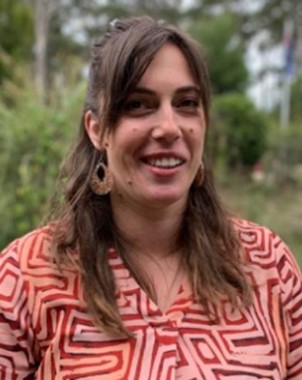October 2025
The Victorian Government has released the Phase 2 Eminent Panel for Community Engagement Recommendations Report on the Central Highlands and has provided a response to these recommendations, alongside recommendations from the Great Outdoors Taskforce.
The Phase 2 Report provides 33 recommendations to government about the future use and management of Central Highlands state forests.
The Phase 1 Report was released in August 2022 and provides 14 recommendations to enhance the future use and management of the Strathbogie Ranges and Mirboo North Immediate Protection Areas.
Over 16,000 Victorians contributed to the Panel, in one of the largest forest management engagement processes in the state’s recent history. The Panel heard that communities love and respect their forests and want to be able to access nature when they need it.
Through these processes, government has heard the views of stakeholders and Traditional Owner partners with interests in the environment, tourism, recreation, industry and policy, from across local communities and bush user groups to statewide peak bodies and land management agencies. This work highlighted there is more common ground than differences between stakeholders, and a strong desire for people to work with each other and government to ensure that land is appropriately managed for a range of values. Stakeholders across the board agreed that we need to find a way forward for balancing conservation, recreation, and economic opportunities within our state forests.
The Victorian Government is investing $30 million in its initial response to the Recommendations through 4 key actions:
- Protecting our environment
- Resetting the management framework for state forests
- Working together for healthy forests
- Driving recreation and tourism investments in regional economies.
Read the detailed government response to the Future of Forests recommendations.
Download the Panel’s Reports
Future use and management of Central Highlands State Forests – Appendices (PDF, 3.4 MB)
The Victorian Government thanks the Eminent Panel for Community Engagement and the Victorian community for providing such detailed and considered advice throughout this process.
An Eminent Panel led conversations with Traditional Owners and the community
An Eminent Panel for Community Engagement commenced in 2021. It led conversations with the Victorian community on the Immediate Protection Areas and surrounding state forests. The work is now complete and the Victorian Government is currently considering the panel's report.
The panel includes people with strong standing in the community and experience.
As land and rights holders Traditional Owner Corporations were formally represented on the panel and this is a critical step towards self-determination.
This governance model was developed in partnership with Traditional Owner Corporations.
The panel committed to genuine partnership with Traditional Owners and heard from a wide range of voices from communities, stakeholders and peak bodies interested in these forests.
The Eminent Panel’s terms of reference
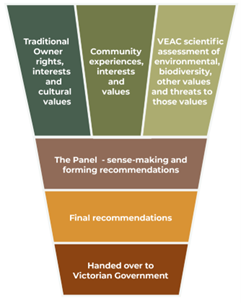 The Eminent Panel produced written reports for the:
The Eminent Panel produced written reports for the:
- state forests in Central Highlands (complete)
- immediate Protection Areas in the Strathbogie Ranges and Mirboo North (complete).
Each report provided advice and recommendations to the Minister for Environment including:
- land classification of state forest
- permissible uses in those areas, and
- proposed timing for the advice and recommendations to occur.
Advice and recommendations were formed after listening to communities and stakeholders. This included for future forest uses, access and protections.
In its work, the Eminent Panel considered:
- findings of scientific assessments of the Victorian Environmental Assessment Council
- opportunities for the management of public land by Traditional Owners and managing to Country biocultural values
- environmental protections, including protecting habitat and for biodiversity
- the potential for cultural overlays
- commitments of key policies
- providing for the wide range of community uses of forest areas.
The Eminent Panel’s recommendations and advice will support Aboriginal engagement and Traditional Owner self-determination. This includes acknowledgement of Traditional Owner rights, interests and aspirations for these forests and lands.
The Eminent Panel finished its work on the Strathbogie Ranges and Mirboo North Immediate Protection Areas in December 2022 and it's work on the Central Highlands state forest in October 2024. Both reports are being considered by the government.
The Great Outdoors Taskforce is considering the state forests outside of the Central Highlands, Strathbogie Ranges, and Mirboo North.
Panel members
Karen Cain, Chairperson
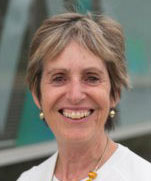 Karen has significant senior experience working across government, leading strategic innovation, and developing and implementing policy in the public sector.
Karen has significant senior experience working across government, leading strategic innovation, and developing and implementing policy in the public sector.
Karen’s career in education as a teacher, principal and senior public sector manager in 2 states, Victoria and Tasmania, led to experience in working across communities to link and build partnerships that harness capacity and growth.
These roles, particularly in regional areas, have led to a strong understanding and commitment to the role of the public sector based on system leadership practice that involves and benefits those it serves.
Her experience in developing and delivering on issues that reflect what matters to the community and government led to her appointment as Chief Executive Officer at the Latrobe Valley Authority, which she held from April 2017 to December 2021.
As CEO, she led industry and community transition across the Latrobe Valley and Gippsland and contributed to state and national transition debate, practice and policy.
In addition, as Director Community Transition Forestry with the Department of Jobs Precincts and Regions for 2 years, Karen successfully led engagement with communities across Victoria as part of the Victorian Forestry Plan implementation.
Karen is a fellow of Leadership Victoria’s Williamson Community Leadership Program and was also a member of the Gippsland Regional Managers Forum for 6 years.
She was awarded the Institute for Public Administration Australia Victorian Top 50 Public Sector Women Award in 2018.
Melissa Wood, Chairperson of VEAC
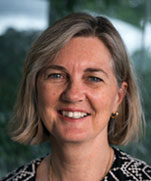 Mellissa Wood has over 30 years’ experience in leading and providing scientific and strategic advice on sustainable development, resource and environmental management; food, land and water systems; and their interconnectedness. She has held senior leadership positions with the Australian Government and internationally, including UN Food and Agriculture Organization (FAO) and CGIAR. Her international expertise covers Europe, Sub-Saharan Africa, SE Asia and the Pacific.
Mellissa Wood has over 30 years’ experience in leading and providing scientific and strategic advice on sustainable development, resource and environmental management; food, land and water systems; and their interconnectedness. She has held senior leadership positions with the Australian Government and internationally, including UN Food and Agriculture Organization (FAO) and CGIAR. Her international expertise covers Europe, Sub-Saharan Africa, SE Asia and the Pacific.
Mellissa has extensive domestic and international public sector governance experience. She recently moved to Victoria after retiring as General Manager, Australian Centre for International Agricultural Research (ACIAR) and as a member of CGIAR’s System Council and System Management Board and Chair of Asia Pacific Association of Agricultural Research Institutes (APAARI). She was Director of the Australian International Food Security Centre (2015-2012), worked at the FAO, Rome as a Director, Global Crop Diversity Trust (2012-2007) and spent 15 years at the Bureau of Rural Sciences, Federal Department of Agriculture, Forestry and Fisheries providing scientific advice to support natural resource management decision-making.
Mellissa holds a Master of Public Policy (Development Policy) from Crawford School of Public Policy, Australian National University, Bachelor of Science (Resource and Environmental Management) from the Australian National University and is a graduate of the Australian Institute of Company Directors (GAICD).
Mellissa is a Visiting Scientist CSIRO, Food Systems and Global Change, Expert Evaluator for the international AGFUND, Independent Adviser, University of Queensland and a member of international and domestic Advisory and Steering Committees, including the Victorian Commissioner for Environmental Sustainability Reference Group.
Katherine Mullett, Gunaikurnai Land and Waters Aboriginal Corporation
Katherine is a proud Gunaikurnai, Ngarigo Monero woman. Katherine came to GLaWAC from Parks Victoria, where she developed a strong background in Cultural Heritage Management and Land Management. She worked as the Parks Victoria Aboriginal Heritage Coordinator East Region for the past 6 years. She has had roles as a Ranger at both Buchan and Bairnsdale and has an active Fireline role. She was previously a member of the Gunaikurnai Traditional Owner Land Management Board (6 years) and Subcommittee Member to the Gunaikurnai Land and Water Aboriginal Corporations, Audit and Risk Committee.
Katherine’s current position at GLaWAC (General Manager of On Country) oversees the large scale of On Country operations while developing and delivering on strategic components of the organisation.
Mike Nurse, Taungurung Land and Waters Aboriginal Corporation
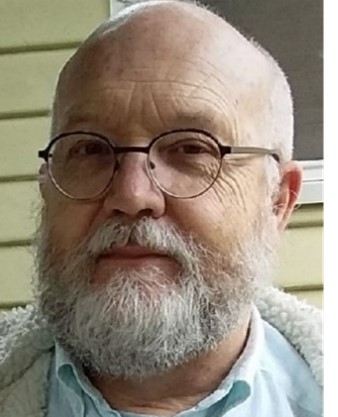 Mike is the nominee of Taungurung Land and Waters Council, representing the group for matters affecting Taungurung Country, including the Strathbogie Ranges and the Central Highlands Immediate Protection Areas.
Mike is the nominee of Taungurung Land and Waters Council, representing the group for matters affecting Taungurung Country, including the Strathbogie Ranges and the Central Highlands Immediate Protection Areas.
Mike is Director, Cultural Land Management Policy and Programs. In this role, he develops and manages TLaWC’s Cultural Land and Water policy and program agenda through a range of strategies and partnerships to support Taungurung community cultural objectives and strategic priorities in land management.
Mike is a community livelihoods and cultural land management specialist with over 30 years’ experience in Indigenous and local community led natural resource management in temperate and tropical Australia, the Pacific, South and South East Asia, Central and Eastern Africa and Latin America.
Mike has experience of working for a cross section of NGOs, the private sector and government.
Shani Blyth, Bunurong Land Council Aboriginal Corporation
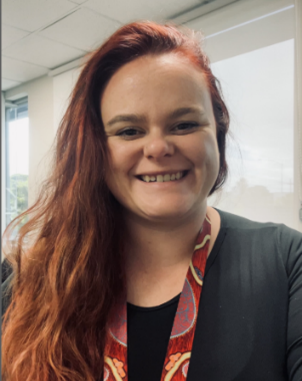 Originally from Flinders Island, Shani has worked within the Conservation field for the last 9 years. First working with Phillip Island Nature Parks conducting various projects, including Wildlife Management, Wildlife Rescue and Rehabilitation, Habitat Restoration and Weed control works, Compliance, Cultural Heritage Management and threatened species management.
Originally from Flinders Island, Shani has worked within the Conservation field for the last 9 years. First working with Phillip Island Nature Parks conducting various projects, including Wildlife Management, Wildlife Rescue and Rehabilitation, Habitat Restoration and Weed control works, Compliance, Cultural Heritage Management and threatened species management.
She is now the Land, Water and Environment Manager at the Bunurong Land Council, establishing the Environment Team to conduct Caring for country conservation and rehabilitation outcomes on Bunurong Country.
A cultural landscapes context
The Immediate Protection Areas are located within important cultural landscapes to many Traditional Owner groups. The Eminent Panel’s partnerships with Traditional Owners help it to understand this cultural context. This includes working with Aboriginal Corporations for each Immediate Protection Area.
This includes:
Strathbogie Ranges Immediate Protection Areas
- Taungurung Land and Waters Council Aboriginal Corporation
Mirboo North Immediate Protection Areas
- Gunaikurnai Land and Waters Aboriginal Corporation
Central Highlands Immediate Protection Areas
- Bunurong Land Council Aboriginal Corporation
- Gunaikurnai Land and Waters Aboriginal Corporation
- Taungurung Land and Waters Council Aboriginal Corporation
- Wurundjeri Woi Wurrung Cultural Heritage Aboriginal Corporation
Page last updated: 21/10/25
